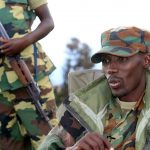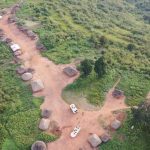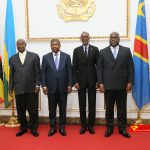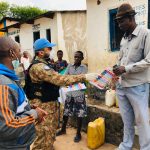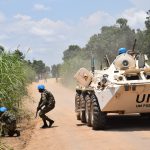The Gynecologist surgeon, founder and director of the Panzi Hospital, Dr Denis Mukwege, Nobel Peace Prize 2018, on the occasion of the International Justice Day which commemorates the adoption of the Rome Statute of the International Criminal Court (ICC), demanded the application of the recommendations of the United Nations Mapping Report which describes the most serious violations of human rights and international humanitarian law committed in the Democratic Republic of Congo (DRC) between March 1993 and June 2003. In this same straight line, “ the man who treats women victims ” did not fail to return in particular to the massacre of more than 200 civilians, which occurred on the night of July 16 to 17, 200, in Kipupu, capital of Itombwe sector, in Mwenga territory, in South Kivu province.
Creation of an International Criminal Court for the DRC
The founder of the Panzi Foundation believes that a lasting solution can only come from the application of the recommendations of the mapping report, synonymous with the end of impunity. According to the Nobel Peace Prize winner, to date none of the recommendations contained in this report have been implemented. Hence, he recommends the creation of an international criminal tribunal for the DRC. “As the ICC is only competent for crimes committed after July 2002 and given the regional dimension of the conflict in the DRC, where various foreign armies and rebel groups have intervened and must also be held to account, we are taking advantage of this Day of International Justice to urge the Congolese authorities and the international community to create an International Criminal Court for the DRC and / or mixed specialized chambers, competent from the beginning of the 90s until today, ”he recommends. And this, before adding: “As long as impunity persists and the recommendations of the United Nations Mapping report are ignored, the massacres of the Congolese will continue”.
What about the Mapping report
For those who do not know, the Mapping report was produced by the Office of the United Nations High Commissioner for Human Rights. It describes the most serious violations of human rights and international humanitarian law committed in the Democratic Republic of Congo (DRC) between March 1993 and June 2003. In fact, it is a dense and detailed document, based on extensive research and rigorous procedures carried out by a team of around 20 Congolese and international human rights professionals over a 12-month period, and which includes a considerable amount of information relating to crimes committed by Congolese rebel groups and by national armed forces from the DRC, Rwanda, Uganda, Angola, Chad, Burundi, and Zimbabwe as well as other armed groups, on Congolese soil.
This report, which contains more than 581 pages, covers nearly 617 of the most serious incidents that occurred in all of Congo over a period of 10 years. It provides details of serious cases of massacres, sexual violence and attacks against children, as well as other abuses committed by a range of armed actors including, foreign armies, rebel groups and Congolese government forces.
War crimes, crime against humanity
It should be noted that this report devotes specific chapters to crimes of sexual violence against women and girls, as well as to violence against children. It also devotes a chapter to the role played by the exploitation of natural resources in relation to the crimes committed in the Congo. The purpose of this section is to “adequately reflect the scale of these acts of violence committed by all armed groups” against the most vulnerable. The report concludes that the majority of documented crimes can be characterised as crimes against humanity and war crimes. ![]() Hence the merits of the insistent demand of the 2018 Nobel Peace Prize for the recommendations of this report to be implemented, given that the perpetrators of the current crimes are often the same who were implicated in most of the crimes. of the past, in order to radiate justice and end impunity. “I hope that for the commemoration of the 25th anniversary of the massacre committed in Lemera, I will find on the spot a peaceful community, whose suffering will have been recognized, whose dead will benefit from a dignified burial, and whose executioners will have finally been judged. for their crimes. I bet that together we will do it! “, Concluded Dr Mukwege, who is only waiting for the implementation of the recommendations of the United Nations Mapping Report.
Hence the merits of the insistent demand of the 2018 Nobel Peace Prize for the recommendations of this report to be implemented, given that the perpetrators of the current crimes are often the same who were implicated in most of the crimes. of the past, in order to radiate justice and end impunity. “I hope that for the commemoration of the 25th anniversary of the massacre committed in Lemera, I will find on the spot a peaceful community, whose suffering will have been recognized, whose dead will benefit from a dignified burial, and whose executioners will have finally been judged. for their crimes. I bet that together we will do it! “, Concluded Dr Mukwege, who is only waiting for the implementation of the recommendations of the United Nations Mapping Report.


